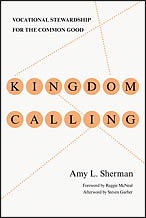
Amy Sherman begins Chapter 8 of Kingdom Calling: Vocational Stewardship for the Common Good (InterVarsity Press, 2011) with a bang!
Jesus is actually looking for people He can trust with His power. — Dallas Willard
Faithful vocational stewardship is not only about doing, it’s also about being. To deploy their vocational power for the common good, believers must possess a character that handles this power humbly and eschews its misuse. This is why discipling for vocational stewardship involves not only the work of inspiration and discovery but also an emphasis on formation (italics in original. Sherman, 129).
What do you think of power, particularly as a follower of Christ? How do you discuss its use in your household, local congregation, neighborhood, department, lab group, campus fellowship? Ever been in a mentor-mentee conversation such as the one young Spiderman found himself in with Uncle Ben?
I’m reminded that those engaged in higher education as young scholars are truly involved in a maturation process. Sherman helpfully highlights four key character traits as the beginning of wise vocational stewardship. As you consider these character traits, what Biblical texts and stories from your experience in higher education give testimony to their value?
- Servanthood
- Responsibility
- Courage
- Humility
In the deploying of vocational power, Sherman offers the approach of “doing so in a way that accords with how God manages his power. Put simply, God manages his power by sharing it, and we must imitate that modus operandi” (136). She briefly unpacks
- The Creation story highlighting the cultural mandate (Genesis 1:28, 2:15) which continues despite the Fall (Genesis 3).
- Jesus’ power sharing with His disciples (John 14:12).
- The consummated kingdom of God as presented in the book of Revelation (Revelation 3:21, 5:10).
- Power disparities in our own culture and how those with power have opportunity to come alongside the poor and dispossessed to labor with them, i.e., to bring power alongside them. Note: Sherman includes a great quote from Andy Crouch’s Culture Making: Recovering Our Creative Calling (InterVarsity Press, 2008).
So what are the four pathways of deploying vocational power?
- Blooming where you’re planted.
- Donating.
- Inventing.
- Investing.
Much more to say, but I’ll conclude with asking you to to prayerfully consider the application of Sherman’s introduction to Blooming where you’re planted and some advise regarding “intellectual hospitality” from Kim Phipps, president of Messiah College.
The primary and most important avenue for deploying vocational power is in and through one’s present work. The first place believers should look to conduct their foretaste-bringing mission is right at the current job they hold (144).
[Intellectual hospitality involves] care and concern for the person, and it also necessitates inviting others into conversation, listening without prejudging, and affirming the value of others and their perspectives even when legitimate disagreement exists. Most important, intellectual hospitality involves the virtue of epistemological humility, which roots our openness to the views of others in the recognition that our own mental powers are limited and that the cognitive, experiential, and affective insights of others, especially when they are different from our own, can truly deepen and extend our understanding of others and the world that surrounds us (Kim Phipps. 146).
May God the Father grant each and every one of us the grace to grow in wisely stewarding/deploying the vocational power granted to us. May we truly embrace a Kingdom Calling in the New Year, a life of righteousness to His glory.
Tom enjoys daily conversations regarding living out the Biblical Story with his wife Theresa and their four girls, around the block, at Elizabethtown Brethren in Christ Church (where he teaches adult electives and co-leads a small group), among healthcare professionals as the Northeast Regional Director for the Christian Medical & Dental Associations (CMDA), and in higher ed as a volunteer with the Emerging Scholars Network (ESN). For a number of years, the Christian Medical Society / CMDA at Penn State College of Medicine was the hub of his ministry with CMDA. Note: Tom served with InterVarsity Christian Fellowship / USA for 20+ years, including 6+ years as the Associate Director of ESN. He has written for the ESN blog from its launch in August 2008. He has studied Biology (B.S.), Higher Education (M.A.), Spiritual Direction (Certificate), Spiritual Formation (M.A.R.), Ministry to Emerging Generations (D.Min.). To God be the glory!

Leave a Reply